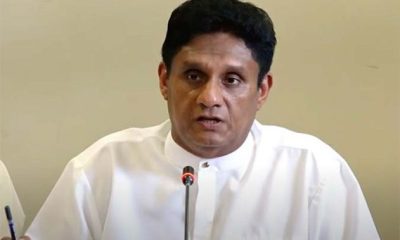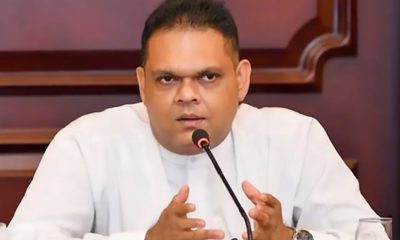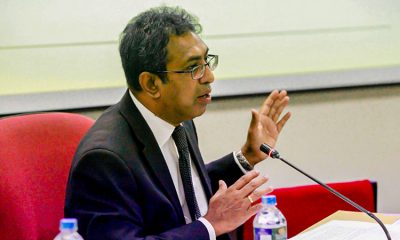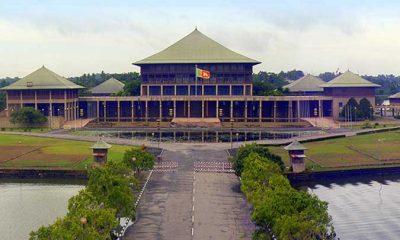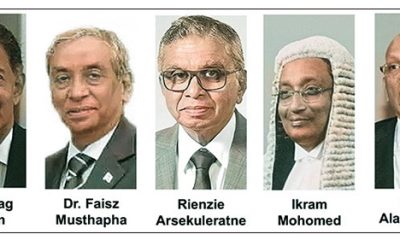News
Wide-ranging proposals on judicial & legal reforms from SJB Lawyers Federation to Sajith
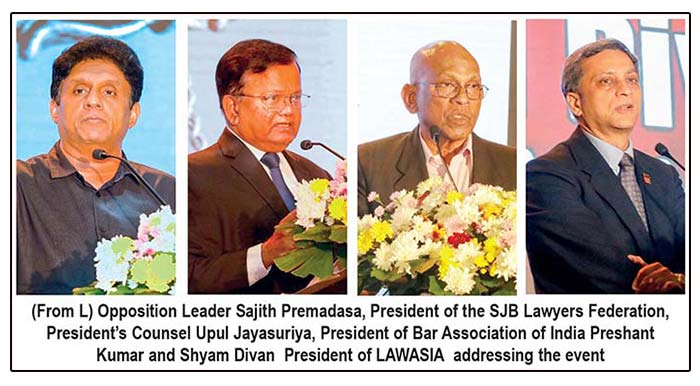
President of the SJB Lawyers Federation, President’s Counsel Upul Jayasuriya, last week handed over a set of 116 proposals itemized as “Legal Reforms for System Change” to Opposition and SJB Leader Sajith Premadasa during a lawyers’ convention held at Jayewardenepura with the participation of over 1,000 lawyers and senior counsel.
Jayasuriya who is the head of the Samagi Lawyers Federation said that they propose these new resolutions as a legal basis for system change in the future.
The following are some of the key proposals: 1) President to be required to engage in a consultative process with stakeholders prior to making judicial appointments. Views emerging through such consultation to be conveyed to the Constitutional Council along with the name/s nominated for their approval.
2) There shall be a Constitutional Court. Retirement age of the judges in that court shall be higher than the Judges of the Supreme Court. All appointments to the Constitutional Court, Supreme Court and Court of Appeal, the Members of the Judicial Service Commission other than the Chairman, shall be made by the President on the recommendation of the Constitutional Council.
3) In the discharge of its function relating to the appointment of the President and Judges of the Constitutional Court, Judges of the Supreme Court and the President and Judges of the Court of Appeal, the Constitutional Council shall obtain the views of the Chief Justice and the two senior-most Judges of the Supreme Court.
4) A more transparent criterion will be proposed for judicial appointments. Including a collegiate system to recommend, based on transparent criteria.
Selection of High Court Judges should be by a mixed and eminent panel consisting of most senior President’s Counsel, Attorney General, President BASL, President Court of Appeal presided over by the Chief Justice. Under normal circumstances the age limits will be as stipulated.
5) Allegations of misbehaviour or incapacity contained in a resolution in the House of Representatives for the presentation of an address for the removal of a Judge of the Constitutional Court, Supreme Court or Court of Appeal shall be inquired into by a panel consisting of three retired Judges of the Constitutional Court or the Supreme Court. Such a panel shall be appointed by the Speaker on the recommendation of the Constitutional Council.
Parliament shall by law provide for all matters relating to the presentation of such an address, including the procedure for the passing of such resolution, the investigation and proof of the alleged misbehavior or incapacity and the right of such Judge to appear and to be heard in person or by a representative. Where the panel determines that the allegations of misbehaviour or incapacity contained in the resolution are not proved, the resolution shall lapse.
6) There shall be a Code of Conduct applicable to Judges of the Constitutional Court, Supreme Court and Court of Appeal. Allegations of serious infractions of the Code of Conduct with negative implications for the Judiciary’s independence, integrity and public trust shall be inquired into by a panel consisting of three retired Judges of the Constitutional Court or the Supreme Court appointed by the President on the recommendation of the Constitutional Council. The panel shall submit its report to the President and the Constitutional Council for appropriate action.
7) All judges of the Court of Appeal and the Supreme Court shall be entitled to enjoy the same salary, same facilities and benefits until death, maintaining total independence of the Judiciary, economically and otherwise. However they shall not hold other offices except that are prescribed by Law.
8) The Court of Appeal to be decentralized (to sit like the Courts of Assize) to take the Appeal Court closer to the people. Senior President’s counsel and President BASL to be consulted in appointing temporary judges
9) The Court of Appeal shall conduct its sittings in each Province. It shall have an original fundamental rights and language rights jurisdiction. An appeal shall lie to the Supreme Court with leave from the Court of Appeal or special leave from the Supreme Court. The civil appellate jurisdiction of the Provincial High Courts shall be transferred to the Court of Appeal sitting in the provinces.
10) In the case of special courts such selected persons should be over the age of 62 years and below the age of 75 years. They should be selected from among retired High Court Judges with a proven track record. Only thereafter the President shall recommend such names to the Constitutional Council.
11) All judicial promotions shall be considered on the basis of completion of the ongoing cases and the delivery of orders and judgements and number of such cases sustained in the appellate court.
12) All judgments of court shall be complied immediately. In instances wherein frivolous appeals have been lodged by the state and damages along with legal interest has accumulated unconscionably, such officers shall be held personally liable for such enhanced damages.
13) A law relating to contempt of courts on the lines of Indian statute shall be passed.
14) The Office of the Attorney-General shall be an independent entity. The Attorney-General shall be the Chief Legal Officer of the Republic and shall uphold and safeguard the sovereignty of the People. It should be ensured that the Attorney General will hold the scales of justice evenly maintaining the highest traditions of the office of Attorney General without being a mouthpiece of the regime in power, in particular issuing certificates on draft legislation.
15) An independent Office of Public Prosecutor shall be set up by law.
16) An independent Office of the Public Defender shall be set up by law.
17) The Attorney-General, Chief Public Prosecutor and Public Defender shall be appointed by the President on the recommendation of the Constitutional Council.
18) Consider the feasibility and scope to recruit external lawyers to the AG’s Department at all levels based on objective criteria calculated to promote better competence and integrity. However, those internal candidates would be given due consideration.
19) Any appointee to the post of Attorney General or the Solicitor General shall not hold office in excess of three years.
20) Delays in serving indictments should be curtailed. All indictments should be filed within three months or the most six months of the alleged crime. In order to complete the backlog, private Lawyers should be hired under the supervision of the AG. Allocation and coordination of such cases will be conducted by a decentralised public prosecutor.
21) In order to curtail delays in trials no postponement shall be granted on the basis that the Lawyer is in another court as is the practice in Indian Courts. This will also give more opportunities to younger Lawyers.
22) Consider timeframes for expeditious conclusion, such as if a criminal trial isn’t completed within a given time span, day to day trials should be held. The right to bail to be enhanced where prosecution isn’t commenced within a determinate time frame.
Latest News
Landslide Early Warnings issued to the districts of Kandy and Nuwara Eliya extended

The landslide early warnings issued to the Districts of Kandy and Nuwara Eliya by the Landslide Early Warning Center of the National Building Research Organisation have been extended till 0600 hrs on 15th February 2026.
Accordingly,
The Level II [AMBER] warnings issued to the Divisional Secretaries Divisions and surrounding areas of Walapane and Nildandahinna in the Nuwar Eliya district and the
Level I [YELLOW] warning issued to the Divisional Secretaries Divisions and surrounding areas of Pathadumbara in the Kandy district have been extended.
Latest News
Advisory for Severe Lightning issued to the Western, Sabaragamuwa and Southern provinces and Badulla and Nuwara-Eliya districts
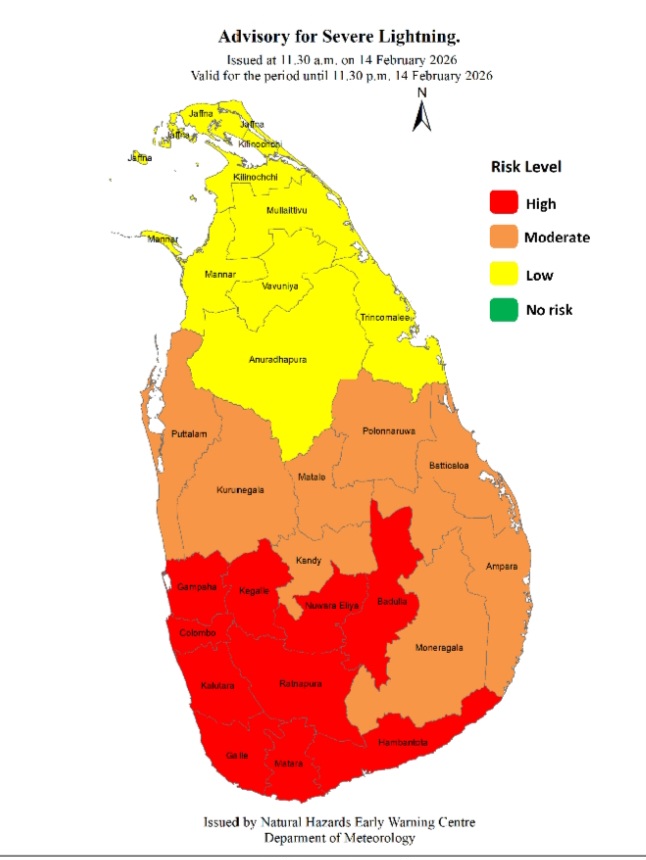
Advisory for Severe Lightning Issued by the Natural Hazards Early Warning Centre at 11.30 a.m. 14 February 2026 valid for the period until 11.30 p.m. 14 February 2026
Thundershowers accompanied with severe lightning are likely to occur at some places in the Western, Sabaragamuwa and Southern provinces and in Badulla and Nuwara-Eliya districts after 1.00 p.m. There may be temporary localized strong winds during thundershowers.
The General public is kindly requested to take adequate precautions to minimize damages caused by lightning activity.
ACTION REQUIRED:
The Department of Meteorology advises that people should:
Seek shelter, preferably indoors and never under trees.
Avoid open areas such as paddy fields, tea plantations and open water bodies during thunderstorms.
Avoid using wired telephones and connected electric appliances during thunderstorms.
Avoid using open vehicles, such as bicycles, tractors and boats etc.
Beware of fallen trees and power lines.
For emergency assistance contact the local disaster management authorities.
Latest News
Teacher recruitment examinations will be conducted in accordance with the relevant court decisions – PM

Prime Minister Dr. Harini Amarasuriya stated that the forthcoming two teacher recruitment examinations will be conducted in accordance with the relevant court decisions pertaining to the ongoing legal proceedings and further noted that, taking into consideration the requests received, steps have been taken to make a request to Court’s approval to revise the conditions of the effective date of degree completion.
The Prime Minister made these remarks while addressing a meeting held at Monaragala Royal College to brief education authorities of the Monaragala District on the new education reforms.
Under the new education reforms, Smart Boards will be provided to 132 schools in the Monaragala District as part of the program to equip secondary schools with modern technology. As a symbolic step under this initiative, Smart Boards were presented to 10 secondary schools under the Prime Minister’s patronage. This program is being implemented with the intervention of the Digital Task Force operating under the Prime Minister’s Office. It was also emphasized that a new digital policy, formulated with special attention to child protection, will be introduced in April.
As part of her visit to the Monaragala District on the 13 th of February, the Prime Minister observed the implementation of the new learning methodologies introduced for Grade One under the new education reforms. She visited Kumbukkana Sri Shanmugam Tamil Maha Vidyalaya and Maduruketiya Maha Vidyalaya in Monaragala to observe the educational activities of Grade One students.
Considering the increase of student numbers and the development of infrastructure facilities, the Prime Minister also approved a proposal submitted by the School Development Society to rename Maduruketiya Maha Vidyalaya as Monaragala Dharmaraja Maha Vidyalaya.
Teachers briefed the Prime Minister that the new education system, supported by revised workbooks and activity-based learning methods, has proven to be effective, with students participating enthusiastically.
Addressing education officials further at the meeting held at Monaragala Royal College, the Prime Minister stated:
“Although this will not provide a complete solution to the existing teacher vacancies, these examinations can offer considerable relief. According to the Court’s previous determination, the effective date of degree completion had been set as 30.06.2025. However, considering numerous requests and following the cabinet approval we have sought Court’s consent to revise this date. We will act in accordance with the decision granted.
Funds allocated for school infrastructure must be utilized transparently and in line with proper planning, and progress must be reported accordingly. We cannot move forward by dividing ourselves along national, provincial, rural, or urban lines. As education authorities, you must make swift and accurate decisions based on correct data.
Further, discussions are already underway within the Piriven Committee of the Ministry of Education to develop Piriven education and to address the issues faced by Piriven teachers.”
The event was attended by the members of the Maha Sangha, Uva Province Governor Attorney-at-Law Kapila Jayasekara, Deputy Minister of Trade and Commerce R.M. Jayawardhana, Member of Parliament Ajith Agalakada, Uva Provincial Education Secretary Nihal Gunarathne, and several officials from the education sector.
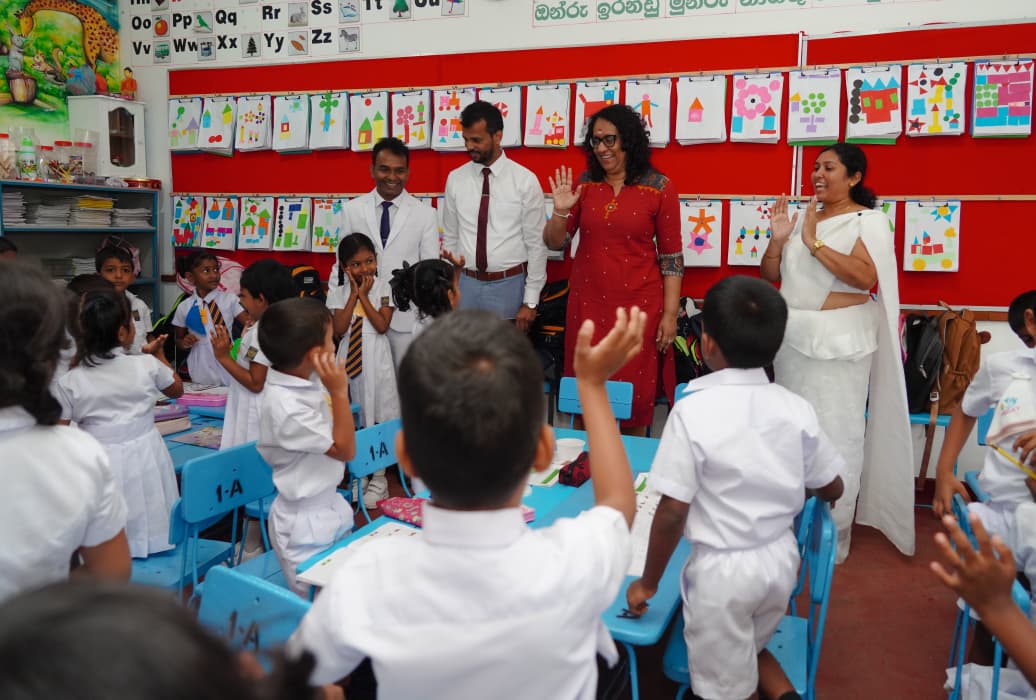
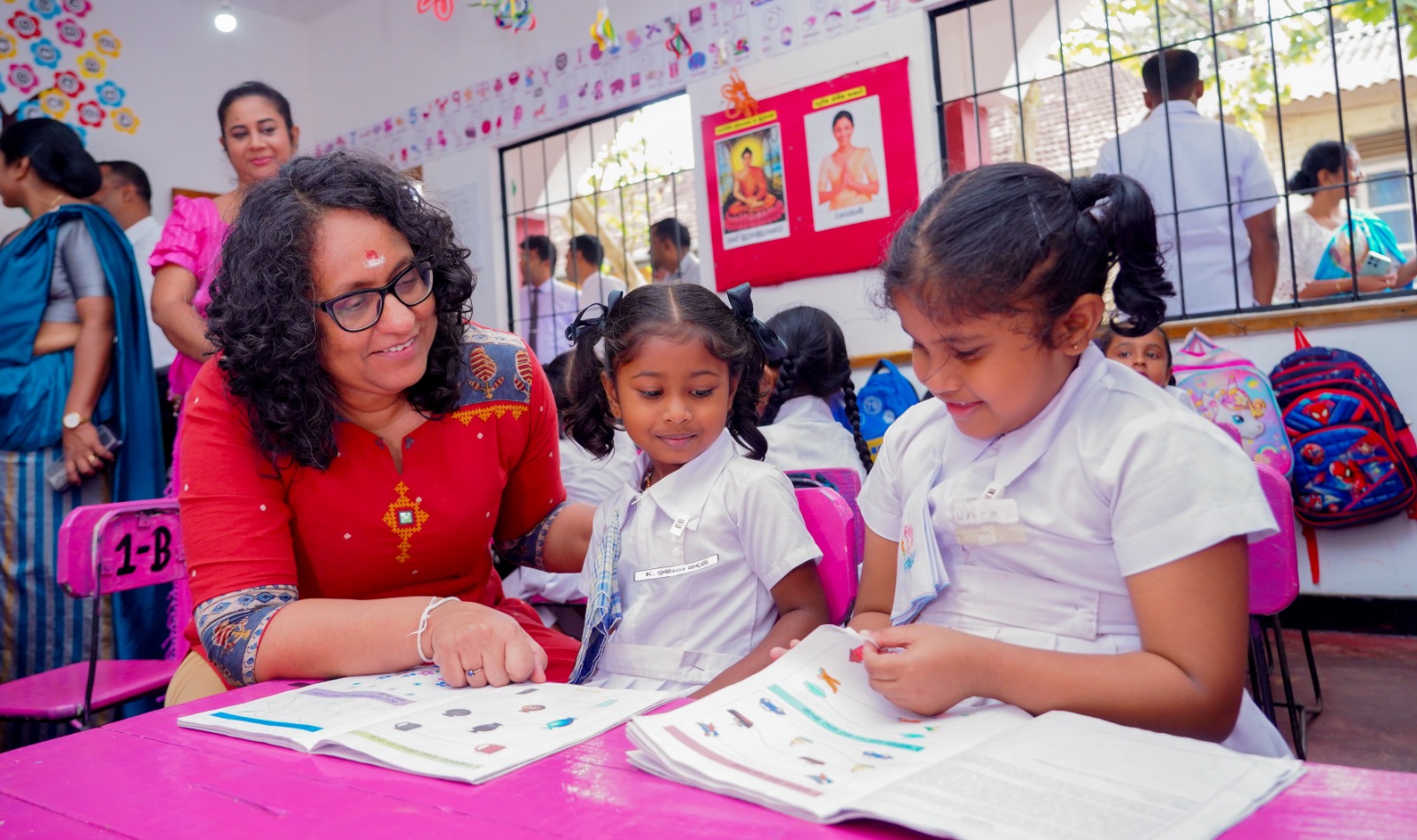

[Prime Minister’s Media Division]
-

 Features7 days ago
Features7 days agoMy experience in turning around the Merchant Bank of Sri Lanka (MBSL) – Episode 3
-

 Business7 days ago
Business7 days agoRemotely conducted Business Forum in Paris attracts reputed French companies
-

 Business7 days ago
Business7 days agoFour runs, a thousand dreams: How a small-town school bowled its way into the record books
-

 Business7 days ago
Business7 days agoComBank and Hayleys Mobility redefine sustainable mobility with flexible leasing solutions
-

 Business4 days ago
Business4 days agoAutodoc 360 relocates to reinforce commitment to premium auto care
-

 Midweek Review4 days ago
Midweek Review4 days agoA question of national pride
-

 Opinion3 days ago
Opinion3 days agoWill computers ever be intelligent?
-

 Midweek Review4 days ago
Midweek Review4 days agoTheatre and Anthropocentrism in the age of Climate Emergency


